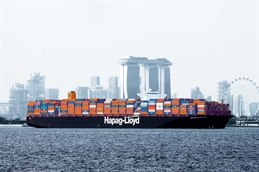
To reduce the CO2 emissions generated by operating ships, Hapag-Lloyd has started testing the use of biofuel in one of its vessels with the aim of replicating this across its fleet once successful.
The German carrier said it started the test by using a B20 fuel — a blend of 80% low sulphur fuel oil (LSFO) and 20% biodiesel based on recycled cooking oils and fats — used for the first time on its “Montreal Express.”
Hapag-Lloyd said the biodiesel generates up to 90% less CO2 emissions than conventional fuels.
Ambitious climate-protection goals
“By the end of this year, we want to have reduced our specific CO2 emissions by 50% compared to the reference year 2008,” said Jörg Erdmann, senior director sustainability management.
“Biofuels like ‘B20’ can help us reach this target. This is because, in addition to having a low sulphur content, the fuel also emits less climate-damaging CO2 during combustion.”
Hapag-Lloyd intends to use the test run with its 4,402-TEU Montreal Express — running through the St. Lawrence Coordinated Service 2 (AT 2) between Europe and Canada.
“We are checking to see whether the share of biodiesel has any adverse effects on the equipment and the fuel processing onboard the vessel. If the test is successful, more ships from Hapag-Lloyd’s fleet could operate using the ‘B20’ fuel in future,” Jan Christensen, senior director purchasing & supply at Hapag-Lloyd added.



